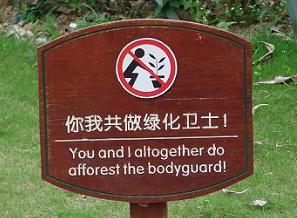May 12, 2007
Let's totally afforest the bodyguard!

Last month, Renato Cruz posted a picture of this sign from a Shenzhen park ("Florestar o guarda-costas", 4/7/2007). A few days ago, Mark Frauenfelder picked it up on Boing Boing ("Funny mangled English sign in China", 5/9/2007).
In pinyin, the sign reads NI3 WO3 GONG4 ZUO4 LYU4 HUA4 WEI4 SHI4, which somehow got translated as "You and I altogether do afforest the bodyguard!"
Someone sent the link to Victor Mair, and he forwarded his analysis to us. In this case, the culprit was not bad dictionary entries, but rather bad syntactic analysis, associated with inappropriate construal of the words.
Here's what happened to it, syllable by syllable, then word by word:
non-commissioned officerThe person(s) who did the English translation on the sign misunderstood the Chinese this way:
i.e. afforest
[as a full verb]
[taking it as direct object
of preceding verb]This is an incorrect grammatical analysis of the sentence, which should be as follows:
[taking it as an adjective
modifying the following noun]
[taking it as head
of predicate nominal]An idiomatic translation of the sign would read something like this:
"Together let's be afforestational protectors."
Less literally:
"Let's work together to protect the afforestation (project)."
Perhaps more people would understand reforestation rather than the less common afforestation, or even more simply, "tree planting". But as it is, the sign certainly got noticed!
Use of an inadequate machine translation program might be responsible for the mis-analysis, but Victor notes
Native speakers of Chinese very often do misconstrue sentences in their own language. As you can see, the grammar is less than explicit.
[Update: Aoshuang (Tim) Xu writes:
As a native Chinese speaker who happened to read your post on Languagelog, I have a different opinion on your translation of "绿化" (or LYU4HUA4 as you put it).
The Chinese "绿化" literally means "to make green", and is used almost always in the sense of "to make green by planting trees or grass". Although the "afforest/reforest" sense can occasionally be the emphasis in some governmental slogans, its "plant grass" sense is always there. As both the photo and your source indicated, the sign is in a park of the city of Shenzhen. Although I have not been to the city of Shenzhen per se, my experience with other Chinese cities, as well as the photo itself, makes me believe the sign is at the side of a lawn rather than a woodland. So what the sign really says is "Let's protect the lawn together."
I have not find a good English word for the full sense of "绿化". Inflectional verbifying of "green" to "greenize" make sense to me, but I haven't seen any of such use, and I am no authority to justify its idiomaticness.
I believe that Victor was relying on the context provided by the sign, which graphically prohibits disturbing or removing a planted sapling, suggesting that the "green" in this case was trees rather than grass. But perhaps the picture is meant to be interpreted more abstractly, and the sign does just mean "keep off the grass". ]
Posted by Mark Liberman at May 12, 2007 10:25 AM